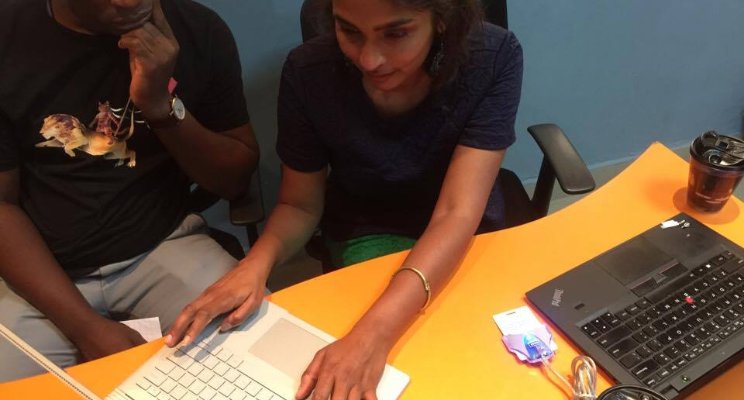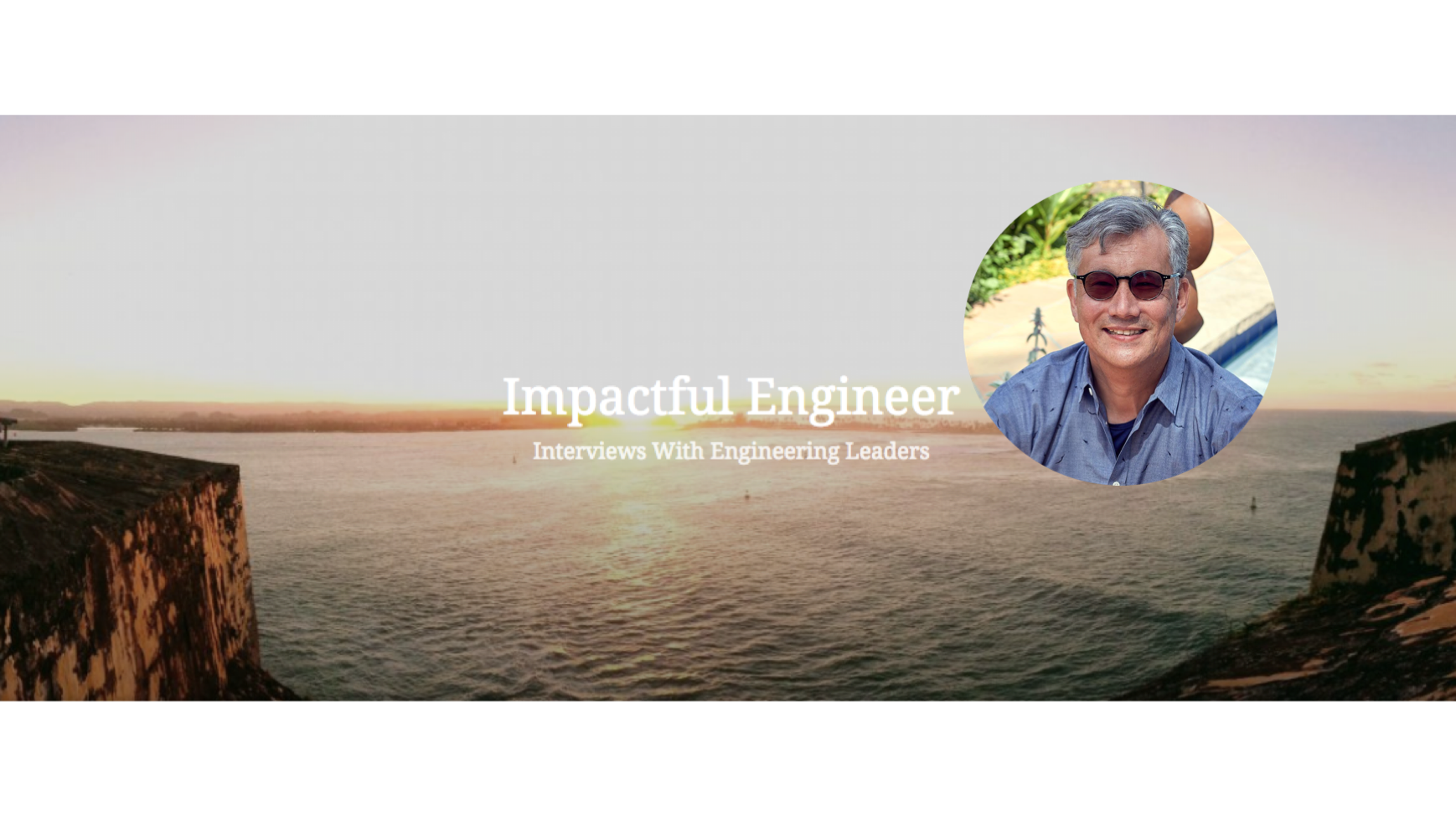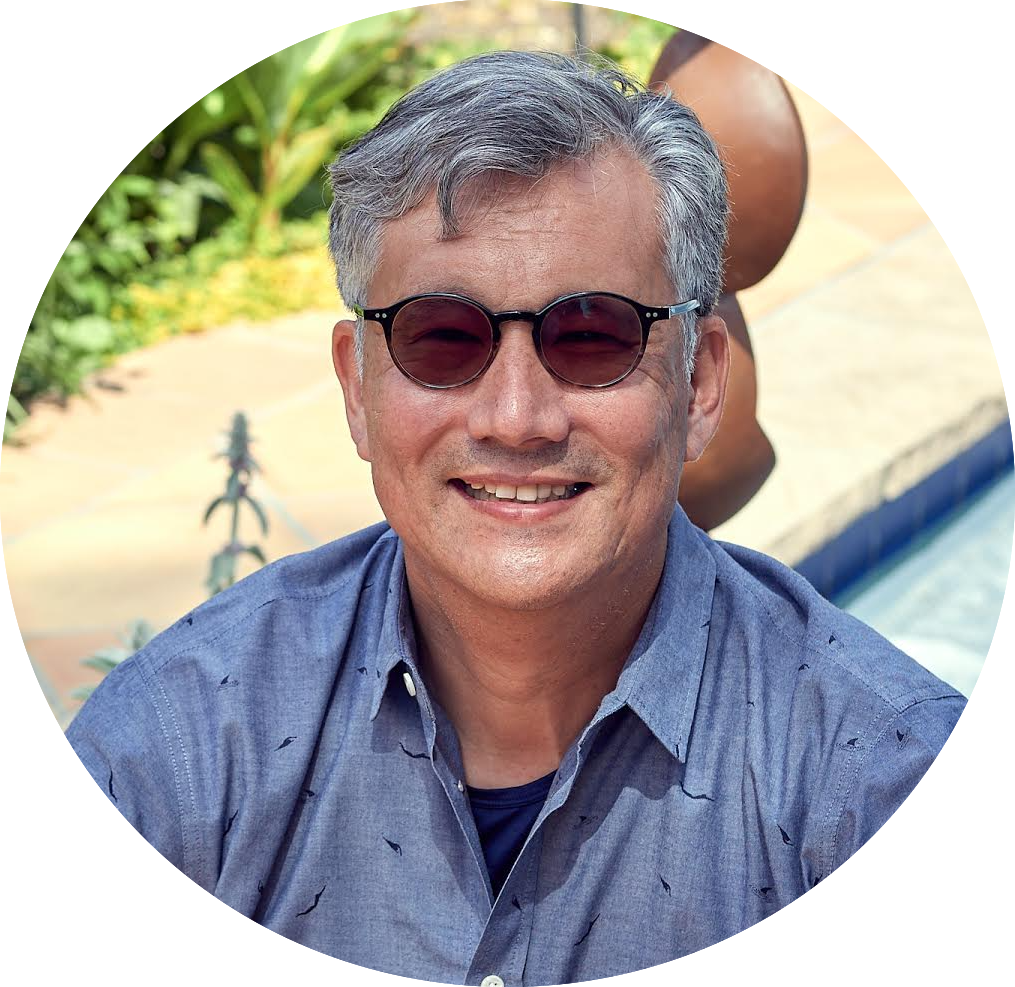
Raji Rajagopalan
Partner Software Engineering Manager at Microsoft

Impactful Engineer shares the stories and journeys of women and men who are making significant impact in the software industry. The purpose of Impactful Engineer is to inspire young software engineers to see that there are many paths they can take to move forward in their careers and grow their impact wherever they work.
Profile: http://rajiraj.com/
https://www.linkedin.com/in/rajiraj/
Interviewed by Sharon Xie, Tony Tam,
Kristal Curtis
Editing by Robin Pille
[beautifulquote align=”full” cite=””]You should talk about your work in terms of the value that it is bringing to the people that you are serving.[/beautifulquote]
Tony: Can you briefly tell us about where you currently work and how your journey led you to where you are today?
Raji: I am a partner engineering manager at Microsoft. I have been working at Microsoft for 12 plus years now. Before then, I got my bachelor’s in computer science in India. I did my master’s in computer science in Canada. I then worked for a company called Schneider Electric for three years. So that’s sort of my journey going back.
Tony: Can you tell us more about your scope of impact within your organization?
Raji: My team’s mission is to help our IT professional customers be the best at their jobs on Windows and Office Platforms. That’s we think about, what we obsess about day in and day out. What do I specifically do?
My role is a combination of a venture capitalist, a therapist or coach, and a culture curator. Here’s what I mean by that.
The first part of my role is like a venture capitalist. I look for the best ideas possible, those great ideas that are going to be successful, and fund those ideas. And to me, in my day-to-day, I’m looking for ideas coming from my team, ideas coming from myself, ideas coming from my partners and from my customers. And I need to make the decision: is this a good idea for the business? Is it something that I want to fund with people? Is this something that I want to work on, something I want my team to deliver on? So, that is a big portion of what I do. Setting the strategy for the company, finding the best ideas, and grooming those best ideas.
The second part of my role is sort of like a coach. A lot of my time is spent on people: growing people, mentoring people, hiring the best people, making sure that these people are happy, retaining them and making them be the best at their jobs. So that’s like being a coach: I talk to them, I hear them. What are the challenges in their jobs? How can I make them better? Are they being the best human being they could possibly be, both from a personal perspective and a professional perspective.
The last part of my role is more the culture curator. I am looking for the cultural aspects, the values I want to nurture in my team, the culture I want to establish. Things about how we are inclusive, about how we’re all growing up to be emotional intelligent human beings and respectful of each other, providing each other an opportunity to grow and be supportive of each other so that we have the right kind of culture I want to set for my team. So that is my impact within the company.
 Tony: In this journey, where do you think you had the most significant growth and learning experience?
Tony: In this journey, where do you think you had the most significant growth and learning experience?
Raji: I learned different things in different stages in my career because at every single point in my career, I intentionally chose to accomplish something that I wanted to be known for. When I was an entry level IC, I wanted to be the champion of engineering excellence within my organization. I chose it because I was passionate about engineering excellence.I knew that there was a gap in my team and I intentionally chose to become the engineering excellence champion. I didn’t think of that at the time as branding. I just wanted to do this. And I grew in that respect, because it was not like I was born an engineering excellence champion. I only knew some things. But I learned a lot about how to drive and influence people towards culture changes, like doing test-driven development or unit tests, and code reviews.
But then, when I became a senior engineer I had this tendency to land myself projects that were screwed up or not on track. Either the code needed to be refactored or, you know, there was something messed up about the project and the people were like “Oh my God, this is the worst project ever.” And I would pick that project intentionally because at that time I wanted to change what I was known for. If a project was screwed up, I wanted people to say “Pick up the phone, call Raji.” So I kind of landed myself those projects and again there was a lot of learning there. It’s not just that I got to be associated with these projects. This was my brand, but it was more. I learned so much from working on these projects that other people had given up on because it was up to me to figure out how to go about fixing them.
Then I became a lead and there was a lot of learning there. My training was all in computer science. No one really teaches you people management and what motivates people, what makes people tick and how to communicate with people in a way where they understand what’s going on and get motivated. When I became a lead, there was a lot of learning in that regard. How to manage people, basic behavioral science, what drives people, and so on. And also how you work with people who are difficult to work with, including managing people out.
And then strategy was what I learned in the next stage of my career. Now I’m a development manager. I have to pick projects that have promise and that are going to make money for the company, right? Strategy was something that I didn’t know how to do before. It’s a journey of learning how to be more strategically savvy.
[beautifulquote align=”full” cite=””]When someone is interrupting me, I don’t think of it as, “Hey they interrupted me because I am a woman.” Instead, I internalize that and say “Oh I need to speak up more,” or “I need to make this point more clearly because it didn’t actually land.”[/beautifulquote]
Sharon: Can you tell us why you decided to make the move from the IC track to the manager track?
Raji: I’m always interested in trying new things. Before I started hiking and running marathons I did not know if I was going to be successful at it. But it interested me. It seemed like there was something that I could learn from that. Maybe I’ll be successful, maybe I’ll like it. In my career, I followed a similar logic. There was an opportunity that came up to lead people. I didn’t know if I was going like it or be good at it, but I thought, “What’s the worst that can happen? Maybe I will not like it, maybe I’ll fail. I can always come back and be an IC.” I knew that my skills were not going to go away if I became a manager. So I took a leap and I raised my hand and I said, “I want this opportunity, can I become a lead?” and I ended up liking it. In another life, I’d probably be a behavioral scientist because I like learning about people. I like learning about why people do certain things and what causes people to not do things a certain way and so on. So I like that aspect of psychology and human behavior and being a leader of people gives you that opportunity.
Sharon: You say you like to try new things, but I see that you’ve been at Microsoft for quite a while. What keeps you there and what motivates you every day?
Raji: So there are a few things I consider to be important when I make a decision on whether to be in a team or not. Keep in mind that Microsoft is a huge company with lots of different varieties of technologies, different teams, a lot of people that you can work with. So, very often I have this decision point of changing my team.
For example, I want to go from working in Azure to working in Windows. Within Windows, I want to go from working on the client side writing kernel code to writing service code, Windows update code. Very often you have to make these decisions, so I give them a lot of thought. I like being intentional about my decisions.
What keeps me in a team or makes me want to change teams? I look for four things.
Number one: I want to have really good people that I work with. People that I love, managers above me that I really like and enjoy and respect. People that are working with me that I respect and love. People who work for me that I absolutely admire. So, people are a very important factor. I want to make my decision based on that.
Second, I want to work on interesting projects that have customer impact and business value. I think that also is important for your career growth. Obviously, there are lots of projects you can work on. You can work with interesting technologies and you can build cool tools, but, it’s important to pick things to work on that are going to have business value and customer value. At the end of the day, you want to have customers, humans that are going to use what you’re building. So that’s important.
The third thing is that I want to constantly be learning. I get excited every day if I come in and I get to learn something great. Every stage of my career has been an immense learning journey for me.
Lastly, I want to have career growth. I always want to feel like my career is not stagnant and that it’s obvious that people are recognizing what I bring to the table.
Microsoft has given me all four of these factors. These are the biggest reasons I stayed within the company. The mission of the company is to “empower every single person and organization on the planet.” That really really resonates with my core value as an individual. At Microsoft, we do a lot of things around the world to make sure that we are empowering people. And the people that I’ve worked with, the ideas that I come across on a day-to-day basis, have made my life a lot richer. Every once a while I think if I didn’t work in technology, if I were at home doing something else like writing, because I love to write, then I would be at home by myself, and I would miss out on opportunities to meet and understand people that are so smart and have so many bright ideas.
[beautifulquote align=”full” cite=””]Even if you feel you might not be up to a particular opportunity, if you raise your hand and give yourself a chance, you might fumble but you will learn.[/beautifulquote]
Sharon: What has your experience been like as a woman in tech?
Raji: My experience has been somewhat unique, and I’m puzzled over that every once a while when I talk to people that I coach. See, I come from India and in India, I was never told that I was not good at math. I hear that here a lot of women enter into technology with that sort of social messaging already given to them, which was not the message for me. We have other problems in India, but that was not the problem that I faced. In fact, people were constantly encouraging me, “Hey, you know, you’re good at math” and so it never occurred to me that I could not be a computer science engineer. I mean I did not choose to be a computer engineer. That was not my first choice. I wanted to be a doctor. Once I chose my career, I did not think that I would not be a good tech person because I was a woman. Instead, I had challenges with communication.
English is not my first language, there was a point in my life that I was new in this country, I would not pick up the phone because I was worried that I wouldn’t understand what they are saying because my own English was so broken. This was 20 years ago. My English was so broken that when I first came to California and the phone would ring, I would think “Oh my God, the phone is ringing and I cannot pick up the phone because they will speak English and they will speak so fast.” I wouldn’t understand what they were saying.
I had to work constantly to overcome that, but I never felt like the men that I was working with were deliberately disrespecting me because I was a woman. Perhaps I just had the good fortune of working with really awesome men in my career, but more likely, it is that I tend to reframe my problems. When someone is interrupting me, I don’t think of it as, “Hey they interrupted me because I am a woman.” Instead, I internalize that and say “Oh I need to speak up more,” or “I need to make this point more clearly because it didn’t actually land.” There are some unique aspects to my own experience as a woman in tech, and so I’m constantly aware of the fact that you cannot take an isolated experience and generalize it.
But I have the fortune of working with many women and many quiet people, and that’s where I derive my advice for folks that ask me for this kind of advice.
Sharon: What advice do you have for women in the tech industry?
Raji: I wrote a blog post about this topic after my conversation with the woman engineer whom I mentor. In my mind, the advice for a woman in tech is not very different than the advice that I give to men in tech. It’s more about personalities than even gender. I meet lots of men who are quiet and introverted and they don’t know how to get across their point, and they get interrupted all the time, which is also a challenge that I hear from a lot of the women engineers that I work with. “How do I work with people who are constantly cutting me off? Who don’t recognize even my presence in the room?”
My advice is, number one, like I said before, pick the project that is going to help you be successful. You have to be passionate about what you work on and you have to make sure that the project that you’re working on is not some grunt project, but it is going to deliver customer value and business value.
And when an opportunity comes, like it did for me with my switch from IC to a lead, take it and give yourself a chance. Remember, I actually did not know whether I was going to be a good lead.
I did not know if people would respect me. But I raised my hand still. I strongly believe in that. Even if you feel you might not be up to a particular opportunity, if you raise your hand and give yourself a chance, you might fumble but you will learn. For a lot of women, the first barrier in their career is confidence. This is true for some men as well. You have to have confidence in yourself. Granted, a lot of people placed confidence in me, starting with my own dad, and also my mentors and all the people that helped me grow in my career. But first and foremost you need to have confidence in yourself. You need to know that you’re going to figure it out. Things may not be so crystal clear right now, but you’ll learn and you’ll figure it out. So, I think the first thing is pick projects that you are passionate about and that have business value, and then raise your hand and volunteer for leadership roles on projects like that.
And the second thing is actually own it on your turf every single day. Do a very good job at what you are doing. You have to be thorough about it. You have to understand what you are doing and you have to really deliver successfully for your team. And lastly, which is a challenge for a lot of women and a lot of introverted quiet people, is to talk about what you’re doing. Talk about it, even if you’re shy. You don’t have to talk about “Sharon, me, I did this.” Talk about your work in terms of the value that it is bringing to the people that you are serving. The work that I do, like I said before, brings a lot of value to IT professionals. It helps them understand their own enterprises and it helps them be the best at their jobs. So I always focus on telling the customer’s story rather than my own story. But you have to tell the story of what you’re building, whether it’s from a customer’s perspective or something else. If you’re just quiet and don’t talk about your team, your people, and yourself, then no one is going to do that for you. So that’s my advice for how you can be successful as a woman in tech.
[beautifulquote align=”full” cite=””]I learned different things in different stages in my career because at every single point in my career I intentionally chose something that I wanted to be known for. [/beautifulquote]
Tony: Do you have any advice for talking about your work, whether it be an elevator pitch, hallway conversations, writing, or giving formal talks? What advice do you have for how to do this well?
Raji: Yes. I think the key thing here is that whatever the medium of your message is, whether you’re writing, speaking, or just giving someone a hallway or elevator pitch, you have to be clear about what the core of your message is going to be. Because one of the challenges I see is that people ramble on and their message gets lost. So, you have to ask yourself “What is the core of the message that I want to convey to this person?” But then, it’s not just the message itself, you have to understand the person that you’re talking to. What is the currency of that person? Is this person a V.P., is this person a customer, is this person a reporter, is this person an engineer that you want to attract and recruit in your team, or is this a fellow engineer? For every single person you want to deliver that core message in a slightly different way, the angle will have to be different. It’s not about changing your message, it’s more about how to resonate with that person, because everybody sees the world through their own unique lens. And so you have to understand that a V.P. will look at your message from the business perspective, versus an engineer who is probably looking at it from a technical perspective. So how you’re conveying what you’re working on should resonate with the person that is your audience.
Tony: Do you have any advice for getting your message through when people are talking over each other in a meeting?
Raji: I saw someone do this recently in a big meeting that I attended. I’ll will give this example and then I’ll circle back to some of the concrete tips that I have. So, this was a big meeting, thirty people, or something like that. There was a mix of senior people and junior people, and people were talking over each other. At one point, this woman just stood up and everyone just looked at her. She stood and then she made a point and she made it very clearly, and then she said “Now we are going to listen to this person, and then we are going to move on.” So, she did two things there. She made her presence known just by the act of physically standing up. People noticed that. Wow, what is she doing? Why is she standing up? Once she had people’s attention she landed her point but she also did one more thing which I really appreciated. She said, this person wants to say something. Let’s hear him. Let’s hear what he’s trying to say and let’s move to the next topic. So she kind of set some of the ground rules there, that when someone is trying to talk you need to give them the chance to talk. I think the ground rules are so important. When you are driving a meeting or even if you are a participant in a meeting, I think it’s useful for you to set the ground rules. Like, we are meant to listen to each other. If someone feels that they are not being heard they are going to raise their hand or stand up or whatever. Raising your hands helps sometimes. But I think setting the ground rules is important because people are people. They don’t intend to be rude, just in the heat of things they run on, because they want to be heard themselves.
So it’s human nature. So at that point it makes sense to call it out. “It looks like things are getting heated. It looks like there’s lots of voices that are getting drowned out in the room. So let’s take a step back and reset this meeting.” So be aware of what’s going on in the room and see who is getting heated up and step in to calm the temperature down.
One thing to remember is projecting your voice. A lot of people have soft voices. Others are not even aware that a soft-spoken person is trying to say something. You might not even know you have a quiet voice. I spoke at a get-together recently. We were celebrating a milestone achieved by one of our directors. I spoke and didn’t have a mic. I always believe that my voice will carry through. I thought that I had a loud voice, but it turned out I did not. I was talking to the crowd and I was thanking this person for doing an amazing job. And then I see my friend standing in front of me motioning with her hands to say “Raise your voice, raise your voice.” And I was very thankful she gave me that cue because I did not know that people couldn’t hear me. So I think projecting your voice helps.
One of my colleagues gave me this advice recently: Even if you don’t say a lot in the meeting and you’re not the loudest voice in the room, how you say something matters. If you believe in what you’re saying, make sure that comes across. It’s important not to sound tentative, like “Maybe I know this, maybe I don’t know this.” This advice applies when you really believe something, obviously. If you don’t believe in it then you have to make that clear, because you don’t want people to take away the wrong message. When you believe something it’s important to sound authoritative and have conviction in what you say.
[beautifulquote align=”full” cite=””]When you pitch an idea to senior people, show them that you’ve thought it through and it’s going to make the business successful or make them as individuals successful. [/beautifulquote]
Tony: How can you best influence decisions when people ultimately making decisions are more senior than you are? For example, what if you are trying to come up with a new design direction and trying to influence somebody two levels above you?
Raji: Think about it from the senior person’s perspective. Put yourself in the shoes of the senior person. Obviously, most people working for companies want to be successful. And they can be successful if they make the best decisions possible. There are obvious biases and things that are screwed up every once in a while. Most of the time, people want to pick decisions, designs, and technologies that are going to make them successful as well. What they are looking for, a senior person, is some level of conviction and credibility in what you are proposing. When you pitch an idea to senior people, show them that you’ve thought it through and it’s going to make the business successful or make them as individuals successful.
So your challenge then is to prove or show that you have thought through this and that your idea is going to give this person the best chance of success. And you can do this in many ways. You can just have one-on-ones with people. Find the influencers of the person you need to convince and have one-on-ones with them to say “Hey, here is my idea and this is why I think it is going to be successful.” Or, have a one-on-one with the person you’re trying to influence. But prototyping, having a little bit of actual validation that something is working, also helps. You have a design idea, you’re thinking about how to use a cool tool, or whatever. If you do a little bit of a prototype and show it to that person, when someone can concretely see something in action there’s going to be more belief in the idea itself.
You can also write up a white paper or some kind of document to pitch your idea, and do prototypes, but ultimately you have to have talk about it.
[beautifulquote align=”full” cite=””]If you want to progress in your career, you have to make sure that people know you, and not just the people you work with on a day-to-day basis. [/beautifulquote]
Tony: Have you seen a situation where something that you were doing or that other people were doing was overshadowing your impact?
Raji: I think the one thing that people with an engineering background tend to overlook is making sure that people know you. This is actually true in my own experience. When I became a manager of managers, I walked into my manager’s office for my first one-on-one thinking we should talk about how I will run the team. Then he sits me down he tells me “Raji, I’ve heard so much about you. You were technically kickass. Every single person I’ve talked to talks about how you’ve run these difficult projects and you come across amazingly from an engineering point of view . But outside of this little world of our team, people don’t know you. If you want to progress in your career, you have to make sure that people know you, and not just the people you work with on a day-to-day basis. You have to be a known commodity inside Microsoft and externally as well.” I did not spend a lot of time early on in my career explicitly for relationship building. I would sit in my office, finish my features, finish my bug fixes, write my tests, and so on. I would work with my seven people that were on my team and we had a very good relationship. We knew each other. We were friends and all that. But then I did not spend a lot of time going out and seeking out people that were going to be influential. I realized, based on this conversation with my new manager, that this was not just for my career, because that’s in a way secondary, but if I wanted to advance my business in a certain way, I could not do it on my own. If I had an idea and I wanted to pitch the idea and I wanted the best backing for the idea, I wanted to make sure that there were people that know me and would trust me. And so then I started actually very intentionally and consciously figuring out who are the people I need to go and start understanding more. Have coffees, have lunches, and meetings and so on to understand what they’re doing, first of all. How can their organization help me and how can my team help them. How can I personally help them. So, figure out who are the people that you need to build relationships with. Even if you do an amazing job, at some point you want to know people that are not in your immediate sphere. Your close friends should not be the only ones who know about you and can speak well about you. You want more people to speak well of the work that you are doing.
It’s very uncomfortable. I know how uncomfortable it is. I’m by nature not a very extroverted person but I know a lot of times you just have to put yourself outside the comfort zone and go seek out these relationships. At the end of the day, I have come to enjoy these relationships that I’ve built over over time. I think that is one thing that we cannot neglect doing.
[beautifulquote align=”full” cite=””]For me now, in this stage of my career, my mission is making a difference in other people’s lives. [/beautifulquote]
Tony: What question did I not ask you I should have asked?
Raji: What do I want out of my career?
Raji: If you were a business, then you have to do a lot of planning. You sit down and think about as an organization, why do we exist? What is the vision? What is the mission for this organization? What are the cultural values you want this organization to have? We should do the same thing for ourselves. Ask yourself: “Why do I exist? What is my mission in life?” And it can be different things at different points in life. I have done this many times, and my answers have been different in different times. My mission ended up evolving. For me now, in this stage of my career, my mission is making a difference in other people’s lives. I think it’s not about just making a living anymore. I really, really, really want to make a difference in other people’s lives. I want to make sure that it’s not just me but I lift other people to the top as well. So I think that’s one thing that I really want to nail. Everybody should think what they want to do. What is it about at this stage in your life: is it about making a buck? Perhaps it is. You still haven’t paid off your student loans? You still have things you need to take care of? From that perspective, it’s okay in this stage of your life to want to make a buck. But then, over time, constantly think about what do you want in this stage of your life and have that answer ready for yourself.
Tony: How far out do you project that mission? Do you plan five years, ten years out?
Raji: I usually do only two years. Because every couple of years there’s some kind of inflection in my own life where I have to rethink this. Even if there is no major inflection, from a life perspective, it is a good idea to check in. “Is this still what is me? Are these my core values? Do I still value freedom and integrity and being able to help others? Are these my core values at this point in my life?” Perhaps it’s different in two years, but we don’t know. I plan for a timeline for two years, but more often than not, I end up planning every year.
Tony: Awesome, thank you so much for your time.
Raji: By the way, it was so much fun doing this interview, and thanks for launching the interviews on Impactful Engineer. I really appreciate what you are doing and I want to see what the end product looks like. You already said that you have four interviews already done. This is awesome. I think there is a lot of potential in here and you should keep working on it.
Tony: Thank you so much. I know you’re pushing me to think bigger. Thank you.
Join Our Pre-released Reader Program
Leave feedback specific to interviews you have read and you will receive an invite from Tony to join our Slack channel to be part of our beta readers group for pre-released interviews and engage with other software engineers.
We ask our beta readers to give us feedback.
- What 1-3 things did you learn from the interviews?
- What 1-3 things are you going to follow and change your own behavior because of the interviews?
- What 1-3 things did you find not helpful at all, or changes to the interview (longer shorter), questions that should be removed or added
Fill out this Google Form to send feedback and join our beta reader program. Feedback will be consolidated and sent back to Raji.
Personal blog
Read more of Raji’s personal blog posts and her wonderful photographs at https://rajigopal.weebly.com/-me.html
More Background Questions
Tony: Could you explain what a partner manager is?
Raji: A partner engineering manager is the last level before the executive level at Microsoft. As a partner manager I am a manager of managers. So I have leads under me who have ICs under them. Twelve years ago, I started at Microsoft at level 59, which is the entry level. I got promoted to SDE2, and then a senior engineer, and then principal engineer. Between when I was a senior and principal engineer, I became a lead, which means managing other engineers. So that was both an expansion of my role, moving to managing people from being an IC, but also a promotion in levels. Very recently actually, just last month, I was promoted to the partner level. It’s one of the biggest things that has happened to me in my life from a career perspective. Out of 95,000 people here at Microsoft, there are 113 women who are partners.







 Tony: In this journey, where do you think you had the most significant growth and learning experience?
Tony: In this journey, where do you think you had the most significant growth and learning experience? 



